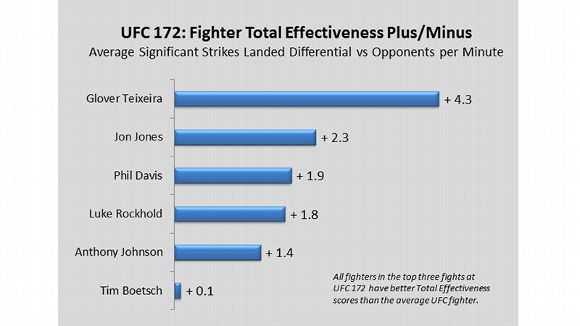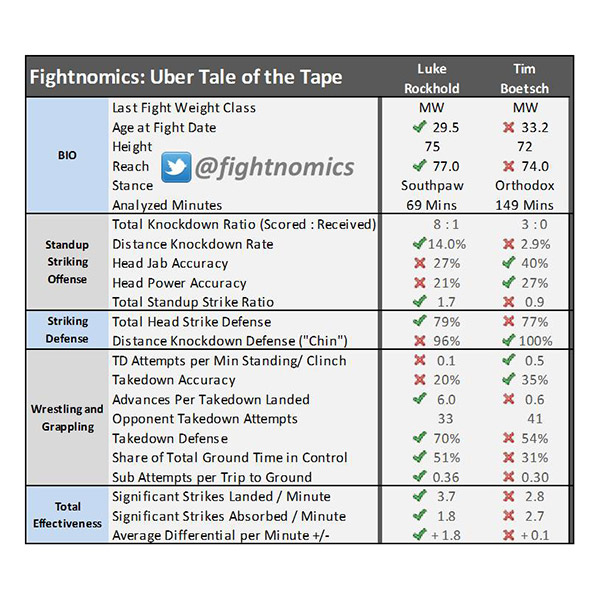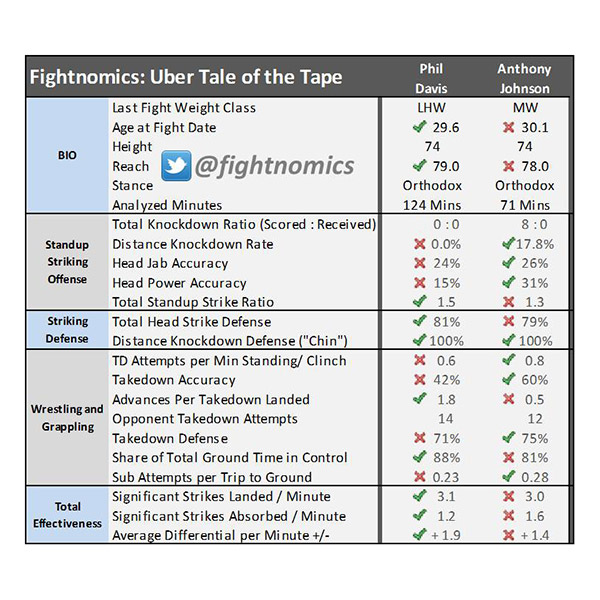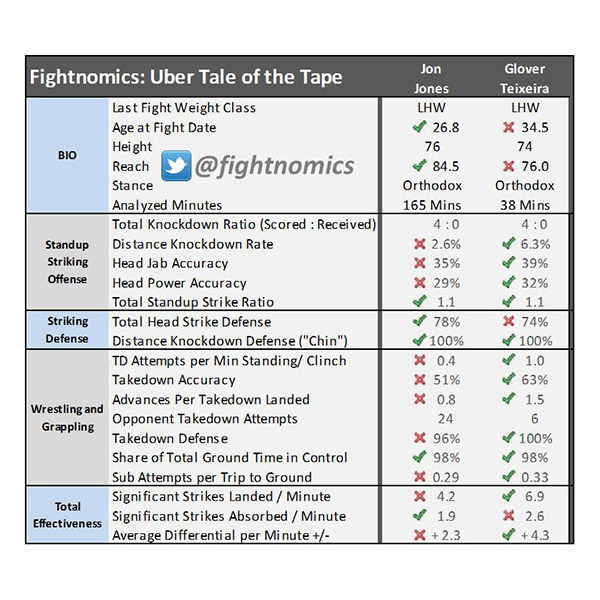Betting UFC 172: Jones vs Teixeira
Which numbers really matter when wagering on the biggest fights?
By Reed Kuhn | ESPN Insider

The UFC makes its debut in Baltimore this weekend, putting the UFC light heavyweight title on the line between two guys who don't lose. But that's the fun of MMA: no teammates to blame, no winning on penalty shots. Just two fighters each putting impressive unbeaten streaks at risk, and only one can walk away a champion. There's a lot at stake for the fighters, but bettors also have much at risk come fight night.
The oddsmakers have come out with their favorites for the top three fights of the card, and the market has generally supported those picks. In all three cases, the younger fighter is the favorite. But our statistic Total Effectiveness Plus/Minus* offers a great measure of how well each fighter in the main three bouts stacks up against the average fighter (0.0). How can Teixeira hold such an advantage in this metric and still be such a heavy underdog?
<!-- photo wide photo -->
 <CITE>Reed Kuhn</CITE>
<CITE>Reed Kuhn</CITE>
<!-- end wide photo -->Read on and take a closer look at the fighters' performance metrics to date, as well as some of effective prop bets that could prove profitable.
<OFFER><CENTER>No. 6 Luke Rockhold minus-1000 vs No. 11 Tim Boetsch plus-650
</CENTER>
We'll start with the steepest odds on the card. In fact, if the lines hold here, Rockhold will be tied for the fourth-biggest betting favorite in UFC history. The Uber Tale of the Tape (chart at right) is our first clue: Rockhold gets a clean sweep by being the younger, longer, southpaw.

Statistically, Boetsch is average in some ways and better in others, although his stat line looks better on paper due to the difference in strength of schedule between the two fighters. He has also proved to be pretty durable, never having been dropped despite succumbing to strikes once. His weakness to date has been against good wrestlers, having lost to the likes of Matt Hamill, Phil Davis, and Mark Munoz. His overall pace of offense is low and nearly equal to the amount of damage he takes, leading to a Total Effectiveness plus/minus that is barely break even.
Meanwhile, he's facing an opponent with better overall offense and better defense. Not a good matchup for "the Barbarian" versus a skilled fighter not afraid of pulling the trigger. Oddly, despite Rockhold's long career in competitive grappling and his advanced submission game, he rarely attempts takedowns. He's a true threat on his feet, and in many cases he simply didn't need to utilize his grappling while throwing his high volume and powerful combinations.
But if he's smart here, he'll realize that Boetsch's weapons will be neutralized if he's put on the mat and has to constantly defend submissions. The longer it lasts, the more Rockhold's conditioning will take over, and the easier it will be to look for an opening either on the feet or on the ground.
Insider recommends: At minus-1000 (or anywhere near it) a straight-up play here is way too expensive, although could be used in parlays with other big favorites. Going with Rockhold on an Inside the Distance bet (sort of MMA's over/under) is a mere minus-180, a far more palatable play despite Boetsch's traditional resilience. Expect Rockhold to utilize his rangy combinations from a distance, then put Boetsch in a tough spot on the ground for an eventual finish. There's more risk in this play, given that Rockhold has just three rounds to finish, and Boetsch has been able to turtle up and survive onslaughts in the past. For that same reason, the return is a lot better, too.
<CENTER>
</CENTER><CENTER>No. 4 Phil Davis minus-175 vs Anthony Johnson plus-155
</CENTER>
These two fighters are of similar size and age, hence their bout boasts the closest betting odds. Davis is merely a mild favorite, and early action came in on Johnson for his return to the UFC.
The stat line actually looks decent for the underdog, so we must cover a big caveat: When it comes to assessing performance metrics here, you have to keep in mind that Anthony Johnson's prior UFC opponents (on which these metrics were calculated), were primarily welterweights, and almost always were at a big size disadvantage against Johnson.

That's really important, because it says his striking success was against guys who he should have been successful against due to his size. Johnson was gigantic at welterweight. A little too much so actually; he missed weight three times, which contributed to his prior dismissal from the UFC. Having discovered that he's a pretty darn good fighter at light heavyweight (and even heavyweight), he now makes his return to the UFC 35 pounds bigger than the weight class in which he first debuted (although technically, he missed weight in that first fight, too).
Johnson's striking game at welterweight (and eventually middleweight) was defined by knockdown power, a metric where he has been one of the best in the business and is top 10 all-time for the UFC. But his losses were equally pronounced by a common theme: grappling. Johnson lost three times in the UFC, each time by rear naked choke.
Given Davis' wrestling skills and his history of finishing opponents with a variety of submissions, we already have a big clue as to how this fight could potentially play out. There's no doubt Johnson is a dangerous striker, but now that he's picking on someone his own size he could be in trouble. Davis absorbs just 1.2 significant strikes per minute on average, which is fourth best in UFC history, and second among active fighters. Good defense is a valuable trait to have against a power striker like Johnson, and look for Davis to nullify Johnson's striking by taking it to the mat and working submissions.
Insider recommends: As far as betting plays go, Davis makes are far more reasonable play straight up than the steep favorites elsewhere on the card as he should be able to out-wrestle Johnson. A smaller a prop bet of an inside the distance win at plus-243, or an even higher line for a submission finish is also a bonus if it hits.
<CENTER>
</CENTER><CENTER>(C) Jon Jones minus-600 vs No. 2 Glover Teixeira plus-450**
</CENTER>
The traditional tale of the tape reveals that this isn't exactly an even matchup on paper. Jones comes in with a huge youth advantage of eight years, and an even more anomalous reach advantage of 8.5 inches. That's a big deal. Jones being the younger and longer fighter is already a clear favorite to win, but given Teixeira's 20-fight win streak, the market is giving him some credit as slightly less of an underdog than any of Jones's last three opponents.
When Jones defends his UFC title, he averages a minus-675 betting favorite. So ask yourself: is Teixeira a more dangerous opponent than the average challenger has been to Jones? I don't think so. Jones is the new archetype for the modern MMA fighter. And despite the trouble he had against Alexander Gustafsson (who shared many of the same strengths that Jones has), Teixeira does not have the same size, youth, and resiliency as the Swede.

Teixeira's stat line is actually pretty good across the board, but this is a huge step up in competition, and also his first matchup where he will be significantly outsized. His prior success in standup striking success is buoyed by minutes spent pressuring tired, older fighters like Fabio Maldonado. The stats are impressive, but less so when we examine the context of when they came. In his most recent fight against Ryan Bader, Teixeira looked badly hurt early on yet caught Bader being over-eager in his attempt to finish. Glover won that fight by knockout, but looked very vulnerable in doing so. Jones also has above average stats in virtually every category, but accumulated them in fights against top talent in the division.
His range, striking defense, and cardio are too good to fall prey to Teixeira the same way others have, and Teixeira's usual style of pushing forward will march him directly into trouble. Jones' wrestling and submission game is also top-notch, as evidenced by submission wins over Machida, Belfort, and others.
While I cringe a little whenever a UFC fight sees betting lines this steep, especially in a title fight, I also simply don't see Teixeira having the arsenal necessary to unseat the current reigning pound-for-pound best in the UFC. Even if we haven't seen Teixeira ever get KO'd, Jones's spinning elbows could actually come into play here and hurt the older fighter. Jones' occasionally unorthodox takedowns could also be a factor, which would put Teixeira in a spot that he has yet to be in while in the UFC -- on his back. The top game of Jones is as dangerous as they come, and he can finish the fight by a variety of methods from there, including vicious elbows.
With these odds a straight-up play on Jones is expensive, and there's always the risk presented by the "puncher's chance" -- which Teixeira certainly has. But heading into deep waters is where Jones will likely start to take over the fight, launching exotic and still fresh attacks that could simply overwhelm Teixeira, the same way Jones defeated Shogun Rua. Jones's wrestling could also excel late in the fight securing dominant position and setting up a potential submission finish.
Insider recommends: About 57 percent of light heavyweight fights end inside the distance, so the Inside the Distance play for Jones currently at minus-170 is properly priced if we assume he will win, and presents a much more reasonable price to pay than the straight up pick at minus-600. A prop bet of plus-500 for a submission win for Jones is also interesting here. It would be the first time Teixeira has ever lost by submission, but Jones is certainly capable of delivering first-time submission losses to elite Brazilians. Just ask Lyoto Machida.
Closing lines: It's a strange card in that the raw metrics look a lot closer than the steep betting lines. But that's where the importance of context comes into play. The favorites are all justified here, and all show a common trait in having good defense on top of their offensive game. Finding value in most cases will require a more specific play via the props, or a parlay of some expensive favorites. And perhaps more interesting than the title at stake is that Rockhold and Davis could each move into title-contention status in their divisions with impressive wins.
<CENTER>
</CENTER><!-- begin inline 1 -->Total Effectiveness Plus/Minus
*Significant strikes are defined as all strikes thrown while standing at a distance, and "power" strikes only (not jabs) while in the clinch or on the ground. This metric also accounts dominant positions, as fighters in control are able to land significant strikes, while those being controlled are less able. The Plus/Minus for this metric indicates on average how effective a fighter is in doing damage relative to what their opponent has done to them.
<!-- end inline 1 -->
**In money line odds presented here, favorites are negative values. E.g., a money line of minus-300 for a favorite means you must risk 300 units to win 100. Underdogs are positive values. E.g., a money line of plus-250 means you win 250 units by risking just 100. Prop bets follow the same rules.
Which numbers really matter when wagering on the biggest fights?
By Reed Kuhn | ESPN Insider
The UFC makes its debut in Baltimore this weekend, putting the UFC light heavyweight title on the line between two guys who don't lose. But that's the fun of MMA: no teammates to blame, no winning on penalty shots. Just two fighters each putting impressive unbeaten streaks at risk, and only one can walk away a champion. There's a lot at stake for the fighters, but bettors also have much at risk come fight night.
The oddsmakers have come out with their favorites for the top three fights of the card, and the market has generally supported those picks. In all three cases, the younger fighter is the favorite. But our statistic Total Effectiveness Plus/Minus* offers a great measure of how well each fighter in the main three bouts stacks up against the average fighter (0.0). How can Teixeira hold such an advantage in this metric and still be such a heavy underdog?
<!-- photo wide photo -->

<!-- end wide photo -->Read on and take a closer look at the fighters' performance metrics to date, as well as some of effective prop bets that could prove profitable.
<OFFER><CENTER>No. 6 Luke Rockhold minus-1000 vs No. 11 Tim Boetsch plus-650
</CENTER>
We'll start with the steepest odds on the card. In fact, if the lines hold here, Rockhold will be tied for the fourth-biggest betting favorite in UFC history. The Uber Tale of the Tape (chart at right) is our first clue: Rockhold gets a clean sweep by being the younger, longer, southpaw.

Statistically, Boetsch is average in some ways and better in others, although his stat line looks better on paper due to the difference in strength of schedule between the two fighters. He has also proved to be pretty durable, never having been dropped despite succumbing to strikes once. His weakness to date has been against good wrestlers, having lost to the likes of Matt Hamill, Phil Davis, and Mark Munoz. His overall pace of offense is low and nearly equal to the amount of damage he takes, leading to a Total Effectiveness plus/minus that is barely break even.
Meanwhile, he's facing an opponent with better overall offense and better defense. Not a good matchup for "the Barbarian" versus a skilled fighter not afraid of pulling the trigger. Oddly, despite Rockhold's long career in competitive grappling and his advanced submission game, he rarely attempts takedowns. He's a true threat on his feet, and in many cases he simply didn't need to utilize his grappling while throwing his high volume and powerful combinations.
But if he's smart here, he'll realize that Boetsch's weapons will be neutralized if he's put on the mat and has to constantly defend submissions. The longer it lasts, the more Rockhold's conditioning will take over, and the easier it will be to look for an opening either on the feet or on the ground.
Insider recommends: At minus-1000 (or anywhere near it) a straight-up play here is way too expensive, although could be used in parlays with other big favorites. Going with Rockhold on an Inside the Distance bet (sort of MMA's over/under) is a mere minus-180, a far more palatable play despite Boetsch's traditional resilience. Expect Rockhold to utilize his rangy combinations from a distance, then put Boetsch in a tough spot on the ground for an eventual finish. There's more risk in this play, given that Rockhold has just three rounds to finish, and Boetsch has been able to turtle up and survive onslaughts in the past. For that same reason, the return is a lot better, too.
<CENTER>
</CENTER><CENTER>No. 4 Phil Davis minus-175 vs Anthony Johnson plus-155
</CENTER>
These two fighters are of similar size and age, hence their bout boasts the closest betting odds. Davis is merely a mild favorite, and early action came in on Johnson for his return to the UFC.
The stat line actually looks decent for the underdog, so we must cover a big caveat: When it comes to assessing performance metrics here, you have to keep in mind that Anthony Johnson's prior UFC opponents (on which these metrics were calculated), were primarily welterweights, and almost always were at a big size disadvantage against Johnson.

That's really important, because it says his striking success was against guys who he should have been successful against due to his size. Johnson was gigantic at welterweight. A little too much so actually; he missed weight three times, which contributed to his prior dismissal from the UFC. Having discovered that he's a pretty darn good fighter at light heavyweight (and even heavyweight), he now makes his return to the UFC 35 pounds bigger than the weight class in which he first debuted (although technically, he missed weight in that first fight, too).
Johnson's striking game at welterweight (and eventually middleweight) was defined by knockdown power, a metric where he has been one of the best in the business and is top 10 all-time for the UFC. But his losses were equally pronounced by a common theme: grappling. Johnson lost three times in the UFC, each time by rear naked choke.
Given Davis' wrestling skills and his history of finishing opponents with a variety of submissions, we already have a big clue as to how this fight could potentially play out. There's no doubt Johnson is a dangerous striker, but now that he's picking on someone his own size he could be in trouble. Davis absorbs just 1.2 significant strikes per minute on average, which is fourth best in UFC history, and second among active fighters. Good defense is a valuable trait to have against a power striker like Johnson, and look for Davis to nullify Johnson's striking by taking it to the mat and working submissions.
Insider recommends: As far as betting plays go, Davis makes are far more reasonable play straight up than the steep favorites elsewhere on the card as he should be able to out-wrestle Johnson. A smaller a prop bet of an inside the distance win at plus-243, or an even higher line for a submission finish is also a bonus if it hits.
<CENTER>
</CENTER><CENTER>(C) Jon Jones minus-600 vs No. 2 Glover Teixeira plus-450**
</CENTER>
The traditional tale of the tape reveals that this isn't exactly an even matchup on paper. Jones comes in with a huge youth advantage of eight years, and an even more anomalous reach advantage of 8.5 inches. That's a big deal. Jones being the younger and longer fighter is already a clear favorite to win, but given Teixeira's 20-fight win streak, the market is giving him some credit as slightly less of an underdog than any of Jones's last three opponents.
When Jones defends his UFC title, he averages a minus-675 betting favorite. So ask yourself: is Teixeira a more dangerous opponent than the average challenger has been to Jones? I don't think so. Jones is the new archetype for the modern MMA fighter. And despite the trouble he had against Alexander Gustafsson (who shared many of the same strengths that Jones has), Teixeira does not have the same size, youth, and resiliency as the Swede.

Teixeira's stat line is actually pretty good across the board, but this is a huge step up in competition, and also his first matchup where he will be significantly outsized. His prior success in standup striking success is buoyed by minutes spent pressuring tired, older fighters like Fabio Maldonado. The stats are impressive, but less so when we examine the context of when they came. In his most recent fight against Ryan Bader, Teixeira looked badly hurt early on yet caught Bader being over-eager in his attempt to finish. Glover won that fight by knockout, but looked very vulnerable in doing so. Jones also has above average stats in virtually every category, but accumulated them in fights against top talent in the division.
His range, striking defense, and cardio are too good to fall prey to Teixeira the same way others have, and Teixeira's usual style of pushing forward will march him directly into trouble. Jones' wrestling and submission game is also top-notch, as evidenced by submission wins over Machida, Belfort, and others.
While I cringe a little whenever a UFC fight sees betting lines this steep, especially in a title fight, I also simply don't see Teixeira having the arsenal necessary to unseat the current reigning pound-for-pound best in the UFC. Even if we haven't seen Teixeira ever get KO'd, Jones's spinning elbows could actually come into play here and hurt the older fighter. Jones' occasionally unorthodox takedowns could also be a factor, which would put Teixeira in a spot that he has yet to be in while in the UFC -- on his back. The top game of Jones is as dangerous as they come, and he can finish the fight by a variety of methods from there, including vicious elbows.
With these odds a straight-up play on Jones is expensive, and there's always the risk presented by the "puncher's chance" -- which Teixeira certainly has. But heading into deep waters is where Jones will likely start to take over the fight, launching exotic and still fresh attacks that could simply overwhelm Teixeira, the same way Jones defeated Shogun Rua. Jones's wrestling could also excel late in the fight securing dominant position and setting up a potential submission finish.
Insider recommends: About 57 percent of light heavyweight fights end inside the distance, so the Inside the Distance play for Jones currently at minus-170 is properly priced if we assume he will win, and presents a much more reasonable price to pay than the straight up pick at minus-600. A prop bet of plus-500 for a submission win for Jones is also interesting here. It would be the first time Teixeira has ever lost by submission, but Jones is certainly capable of delivering first-time submission losses to elite Brazilians. Just ask Lyoto Machida.
Closing lines: It's a strange card in that the raw metrics look a lot closer than the steep betting lines. But that's where the importance of context comes into play. The favorites are all justified here, and all show a common trait in having good defense on top of their offensive game. Finding value in most cases will require a more specific play via the props, or a parlay of some expensive favorites. And perhaps more interesting than the title at stake is that Rockhold and Davis could each move into title-contention status in their divisions with impressive wins.
<CENTER>
</CENTER><!-- begin inline 1 -->Total Effectiveness Plus/Minus
*Significant strikes are defined as all strikes thrown while standing at a distance, and "power" strikes only (not jabs) while in the clinch or on the ground. This metric also accounts dominant positions, as fighters in control are able to land significant strikes, while those being controlled are less able. The Plus/Minus for this metric indicates on average how effective a fighter is in doing damage relative to what their opponent has done to them.
<!-- end inline 1 -->
**In money line odds presented here, favorites are negative values. E.g., a money line of minus-300 for a favorite means you must risk 300 units to win 100. Underdogs are positive values. E.g., a money line of plus-250 means you win 250 units by risking just 100. Prop bets follow the same rules.





